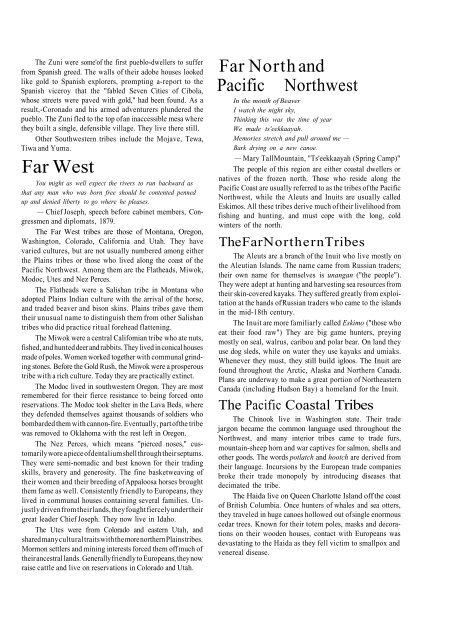Changeling - Players Guide.pdf
Changeling - Players Guide.pdf
Changeling - Players Guide.pdf
Create successful ePaper yourself
Turn your PDF publications into a flip-book with our unique Google optimized e-Paper software.
The Zuni were some'of the first pueblo-dwellers to suffer<br />
from Spanish greed. The walls of their adobe houses looked<br />
like gold to Spanish explorers, prompting a-report to the<br />
Spanish viceroy that the "fabled Seven Cities of Cibola,<br />
whose streets were paved with gold," had been found. As a<br />
result,-Coronado and his armed adventurers plundered the<br />
pueblo. The Zuni fled to the top of an inaccessible mesa where<br />
they built a single, defensible village. They live there still.<br />
Other Southwestern tribes include the Mojave, Tewa,<br />
Tiwa and Yuma.<br />
Far West<br />
You might as well expect the rivers to run backward as<br />
that any man who was born free should be contented penned<br />
up and denied liberty to go where he pleases.<br />
— Chief Joseph, speech before cabinet members, Congressmen<br />
and diplomats, 1879.<br />
The Far West tribes are those of Montana, Oregon,<br />
Washington, Colorado, California and Utah. They have<br />
varied cultures, but are not usually numbered among either<br />
the Plains tribes or those who lived along the coast of the<br />
Pacific Northwest. Among them are the Flatheads, Miwok,<br />
Modoc, Utes and Nez Perces.<br />
The Flatheads were a Salishan tribe in Montana who<br />
adopted Plains Indian culture with the arrival of the horse,<br />
and traded beaver and bison skins. Plains tribes gave them<br />
their unusual name to distinguish them from other Salishan<br />
tribes who did practice ritual forehead flattening.<br />
The Miwok were a central Califomian tribe who ate nuts,<br />
fished, and hunted deer and rabbits. They lived in conical houses<br />
made of poles. Women worked together with communal grinding<br />
stones. Before the Gold Rush, the Miwok were a prosperous<br />
tribe with a rich culture. Today they are practically extinct.<br />
The Modoc lived in southwestern Oregon. They are most<br />
remembered for their fierce resistance to being forced onto<br />
reservations. The Modoc took shelter in the Lava Beds, where<br />
they defended themselves against thousands of soldiers who<br />
bombarded them with cannon-fire. Eventually, part of the tribe<br />
was removed to Oklahoma with the rest left in Oregon.<br />
The Nez Perces, which means "pierced noses," customarily<br />
wore a piece of dentalium shell through their septums.<br />
They were semi-nomadic and best known for their trading<br />
skills, bravery and generosity. The fine basketweaving of<br />
their women and their breeding of Appaloosa horses brought<br />
them fame as well. Consistently friendly to Europeans, they<br />
lived in communal houses containing several families. Unjustly<br />
driven from their lands, they fought fiercely under their<br />
great leader Chief Joseph. They now live in Idaho.<br />
The Utes were from Colorado and eastern Utah, and<br />
shared many cultural traits with the more northern Plains tribes.<br />
Mormon settlers and mining interests forced them off much of<br />
their ancestral lands. Generally friendly to Europeans, they now<br />
raise cattle and live on reservations in Colorado and Utah.<br />
Far North and<br />
Pacific Northwest<br />
In the month of Beaver<br />
I watch the night sky,<br />
Thinking this was the time of year<br />
We made ts'eekkaayah.<br />
Memories stretch and pull around me —<br />
Bark drying on a new canoe.<br />
— Mary TallMountain, "Ts'eekkaayah (Spring Camp)"<br />
The people of this region are either coastal dwellers or<br />
natives of the frozen north. Those who reside along the<br />
Pacific Coast are usually referred to as the tribes of the Pacific<br />
Northwest, while the Aleuts and Inuits are usually called<br />
Eskimos. All these tribes derive much of their livelihood from<br />
fishing and hunting, and must cope with the long, cold<br />
winters of the north.<br />
The Far Northern Tribes<br />
The Aleuts are a branch of the Inuit who live mostly on<br />
the Aleutian Islands. The name came from Russian traders;<br />
their own name for themselves is unangan ("the people").<br />
They were adept at hunting and harvesting sea resources from<br />
their skin-covered kayaks. They suffered greatly from exploitation<br />
at the hands of Russian traders who came to the islands<br />
in the mid-18th century.<br />
The Inuit are more familiarly called Eskimo ("those who<br />
eat their food raw") They are big game hunters, preying<br />
mostly on seal, walrus, caribou and polar bear. On land they<br />
use dog sleds, while on water they use kayaks and umiaks.<br />
Whenever they must, they still build igloos. The Inuit are<br />
found throughout the Arctic, Alaska and Northern Canada.<br />
Plans are underway to make a great portion of Northeastern<br />
Canada (including Hudson Bay) a homeland for the Inuit.<br />
The Pacific Coastal Tribes<br />
The Chinook live in Washington state. Their trade<br />
jargon became the common language used throughout the<br />
Northwest, and many interior tribes came to trade furs,<br />
mountain-sheep horn and war captives for salmon, shells and<br />
other goods. The words potlatch and hootch are derived from<br />
their language. Incursions by the European trade companies<br />
broke their trade monopoly by introducing diseases that<br />
decimated the tribe.<br />
The Haida live on Queen Charlotte Island off the coast<br />
of British Columbia. Once hunters of whales and sea otters,<br />
they traveled in huge canoes hollowed out of single enormous<br />
cedar trees. Known for their totem poles, masks and decorations<br />
on their wooden houses, contact with Europeans was<br />
devastating to the Haida as they fell victim to smallpox and<br />
venereal disease.


